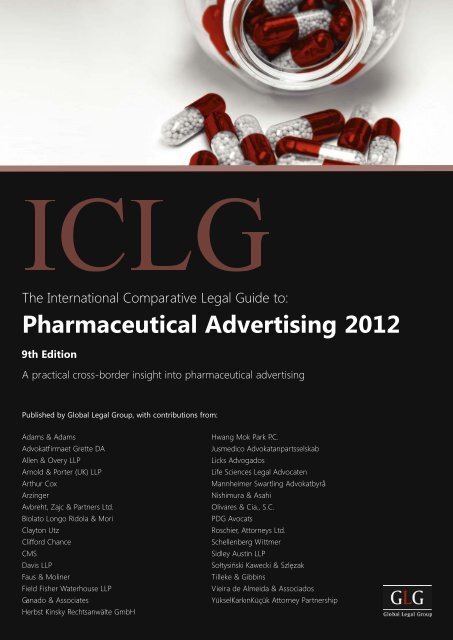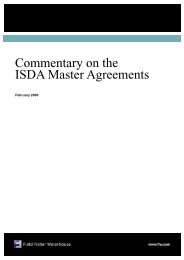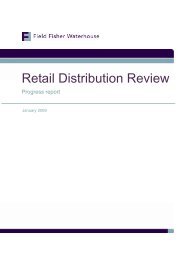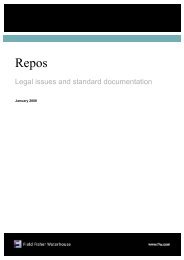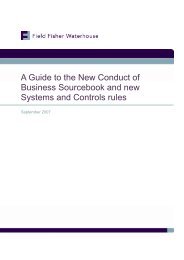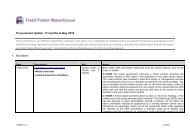Download full PDF article here - Field Fisher Waterhouse
Download full PDF article here - Field Fisher Waterhouse
Download full PDF article here - Field Fisher Waterhouse
You also want an ePaper? Increase the reach of your titles
YUMPU automatically turns print PDFs into web optimized ePapers that Google loves.
The International Comparative Legal Guide to:<br />
Pharmaceutical Advertising 2012<br />
9th Edition<br />
A practical cross-border insight into pharmaceutical advertising<br />
Published by Global Legal Group, with contributions from:<br />
Adams & Adams<br />
Advokatfirmaet Grette DA<br />
Allen & Overy LLP<br />
Arnold & Porter (UK) LLP<br />
Arthur Cox<br />
Arzinger<br />
Avbreht, Zajc & Partners Ltd.<br />
Biolato Longo Ridola & Mori<br />
Clayton Utz<br />
Clifford Chance<br />
CMS<br />
Davis LLP<br />
Faus & Moliner<br />
<strong>Field</strong> <strong>Fisher</strong> <strong>Waterhouse</strong> LLP<br />
Ganado & Associates<br />
Herbst Kinsky Rechtsanwälte GmbH<br />
Hwang Mok Park P.C.<br />
Jusmedico Advokatanpartsselskab<br />
Licks Advogados<br />
Life Sciences Legal Advocaten<br />
Mannheimer Swartling Advokatbyrå<br />
Nishimura & Asahi<br />
Olivares & Cia., S.C.<br />
PDG Avocats<br />
Roschier, Attorneys Ltd.<br />
Schellenberg Wittmer<br />
Sidley Austin LLP<br />
Sołtysiński Kawecki & Szlęzak<br />
Tilleke & Gibbins<br />
Vieira de Almeida & Associados<br />
YükselKarkınKüçük Attorney Partnership
The International Comparative Legal Guide to: Pharmaceutical Advertising 2012<br />
Preface:<br />
Preface by Tom Spencer, Counsel, GlaxoSmithKline Plc.<br />
Contributing Editor<br />
Ian Dodds-Smith,<br />
Arnold & Porter (UK) LLP<br />
Account Managers<br />
Dror Levy, Maria Lopez,<br />
Florjan Osmani,<br />
Oliver Smith, Rory Smith,<br />
Toni Wyatt<br />
Sub Editor<br />
Fiona Canning<br />
Editor<br />
Suzie Kidd<br />
Senior Editor<br />
Penny Smale<br />
Managing Editor<br />
Alan Falach<br />
Group Publisher<br />
Richard Firth<br />
Published by<br />
Global Legal Group Ltd.<br />
59 Tanner Street<br />
London SE1 3PL, UK<br />
Tel: +44 20 7367 0720<br />
Fax: +44 20 7407 5255<br />
Email: info@glgroup.co.uk<br />
URL: www.glgroup.co.uk<br />
GLG Cover Design<br />
F&F Studio Design<br />
GLG Cover Image Source<br />
Stockxchng<br />
Printed by<br />
Information Press<br />
June 2012<br />
Copyright © 2012<br />
Global Legal Group Ltd.<br />
All rights reserved<br />
No photocopying<br />
ISBN 978-1-908070-30-2<br />
ISSN 1743-3363<br />
Strategic Partners<br />
General Chapters:<br />
1 The European Commission’s Proposal on Providing Information to the General Public on<br />
Prescription-Only Medicinal Products - Jackie Mulryne & Silvia Valverde,<br />
Arnold & Porter (UK) LLP 1<br />
2 Pharmaceutical Promotion and the UK Bribery Act - Alison Dennis & Tony Lewis,<br />
<strong>Field</strong> <strong>Fisher</strong> <strong>Waterhouse</strong> LLP 8<br />
Country Question and Answer Chapters:<br />
3 Australia Clayton Utz: Colin Loveday & Greg Williams 13<br />
4 Austria Herbst Kinsky Rechtsanwälte GmbH: Dr Sonja Hebenstreit &<br />
Dr Isabel Funk-Leisch 23<br />
5 Belgium Allen & Overy LLP: Geert Glas & Dieter Delarue 34<br />
6 Brazil Licks Advogados: Otto Licks 44<br />
7 Bulgaria CMS Cameron McKenna: David Butts & Angelika Dimitrova 51<br />
8 Canada Davis LLP: Bill Hearn & Samuel Schwartz 61<br />
9 Czech Republic CMS Cameron McKenna: Denisa Assefová & Vladěna Kuřecová 74<br />
10 Denmark Jusmedico Advokatanpartsselskab: Jan Bjerrum Bach & Lone Hertz 82<br />
11 England & Wales Arnold & Porter (UK) LLP: Silvia Valverde & Ewan Townsend 95<br />
12 Finland Roschier, Attorneys Ltd.: Mikael Segercrantz & Johanna Lilja 108<br />
13 France PDG Avocats: Paule Drouault-Gardrat & Juliette Peterka 118<br />
14 Germany Clifford Chance: Dr Peter Dieners & Marc Oeben 125<br />
15 Hungary CMS Cameron McKenna: Dóra Petrányi & Veronika Bednár 137<br />
16 Ireland Arthur Cox: Declan Hayes & Colin Kavanagh 146<br />
17 Italy Biolato Longo Ridola & Mori: Linda Longo & Andrea Moretti 155<br />
18 Japan Nishimura & Asahi: Somuku Iimura & Yoko Kasai 166<br />
19 Korea Hwang Mok Park P.C.: Kun Su Mok & Hye Yeon Lim 175<br />
20 Malta Ganado & Associates, Advocates: Dr. Anthony Cremona & Thomas Cutts-Watson 183<br />
21 Mexico Olivares & Cia., S.C.: Alejandro Luna & Juan Luis Serrano 195<br />
22 Netherlands Life Sciences Legal Advocaten: Anke E. Heezius 204<br />
23 Norway Advokatfirmaet Grette DA: Felix Reimers & Erik Helstad 212<br />
24 Poland Sołtysiński Kawecki & Szlęzak: Dr. Ewa Skrzydło-Tefelska &<br />
Agnieszka Jurcewicz 222<br />
25 Portugal Vieira de Almeida & Associados: Paulo Pinheiro & Francisca Paulouro 229<br />
26 Romania CMS Cameron McKenna: Valentina Parvu & Ioana Oprea-Barac 238<br />
27 Russia CMS, Russia: Vsevolod Tyupa 247<br />
28 Slovenia Avbreht, Zajc & Partners Ltd.: Andrej Kirm 254<br />
29 South Africa Adams & Adams: Alexis Apostolidis & Pieter Visagie 263<br />
30 Spain Faus & Moliner: Jordi Faus & Rodrigo Osorio 271<br />
31 Sweden Mannheimer Swartling Advokatbyrå: Helén Waxberg & Fredrik Lundegårdh 281<br />
32 Switzerland Schellenberg Wittmer: Andrea Mondini & Christine Beusch-Liggenstorfer 290<br />
33 Turkey YükselKarkınKüçük Attorney Partnership: Gökhan Gökçe & İrem Cansu Atikcan 301<br />
34 Ukraine Arzinger: Timur Bondaryev & Svitlana Postrygan 310<br />
35 USA Sidley Austin LLP: Coleen Klasmeier & Maura Norden 320<br />
36 Vietnam Tilleke & Gibbins: Tu Ngoc Trinh & Dzung Thi Thuy Nguyen 339<br />
Further copies of this book and others in the series can be ordered from the publisher. Please call +44 20 7367 0720<br />
Disclaimer<br />
This publication is for general information purposes only. It does not purport to provide comprehensive <strong>full</strong> legal or other advice.<br />
Global Legal Group Ltd. and the contributors accept no responsibility for losses that may arise from reliance upon information contained in this publication.<br />
This publication is intended to give an indication of legal issues upon which you may need advice. Full legal advice should be taken from a qualified professional<br />
when dealing with specific situations.<br />
www.ICLG.co.uk
Chapter 2<br />
Pharmaceutical<br />
Promotion and the<br />
UK Bribery Act<br />
<strong>Field</strong> <strong>Fisher</strong> <strong>Waterhouse</strong> LLP<br />
Alison Dennis<br />
Tony Lewis<br />
8<br />
The Bribery Act came into force on 1 July 2011. Together with<br />
explanatory guidance published by the Ministry of Justice in March<br />
2011, the new law replaced the outdated UK anti-bribery legislation<br />
which was over 100 years old. The UK was required to implement<br />
modern anti-bribery legislation by the OECD Convention it ratified<br />
in 1999. However, the 2002 enactments by the UK did not to <strong>full</strong>y<br />
achieve this goal and the UK was recognised to have failed to meet<br />
its obligations until enactment of the 2010 Bribery Act.<br />
The pharmaceutical industry has for many years taken a battering<br />
particularly from the US authorities over bribery and kick-backs<br />
and has paid some very substantial fines for breaches of anticorruption<br />
legislation, both in the US and elsew<strong>here</strong>. For this<br />
reason, the pharmaceutical industry has had the opportunity to<br />
consider, in advance, some other industries which behaviours<br />
constitute bribery and which are acceptable ways of doing business.<br />
This detailed consideration of the ethics of selling pharmaceutical<br />
products has brought into existence various industry codes of<br />
practice, such as those published by IFPMA, EFPIA, PhRMA and<br />
ABPI, as well as equivalent codes in the medical devices industry:<br />
EUCOMED; Advamed; and ABHI. Each of these codes define, in<br />
some cases in substantial detail, the promotional activities (as well<br />
as other activities) which are considered by the industries to be<br />
acceptable because they are deemed not to influence the prescribing<br />
habits of medical professionals. The UK’s Serious Fraud Office<br />
(SFO) has indicated that compliance with an industry code might be<br />
evidence that no bribery has taken place, but that this compliance is<br />
not a cast-iron guarantee that the activity will not be scrutinised and<br />
even prosecuted.<br />
This chapter considers whether the promotional activities of<br />
pharmaceutical companies might breach the rules under the Bribery<br />
Act, with a view also of the guidance issued by the Ministry of<br />
Justice. We also look at the ABPI code (as one of the most detailed<br />
industry codes) and consider whether t<strong>here</strong> are any potential<br />
conflicts between the activities which are permitted by the ABPI<br />
code and those which might breach the Bribery Act 2010. We also<br />
consider the extensive extraterritorial jurisdiction engaged by the<br />
Bribery Act and how this might apply to promotion activities<br />
engaged in by global pharmaceutical companies.<br />
As a note of caution, it must be remembered that industry codes on<br />
promotional activities are limited in scope. T<strong>here</strong> are many other<br />
activities engaged in by pharmaceutical companies which might<br />
breach anti-corruption laws. Meeting the requirements of these<br />
codes and laws are t<strong>here</strong>fore only a part of any compliance<br />
programme. Conversely, promotional activities which do not<br />
involve the provision of a benefit to a third party, whether a gift,<br />
benefit in kind or pecuniary advantage, will not breach anti-bribery<br />
legislation, but could breach an industry code.<br />
Promotional Activities and Bribery Act Offences<br />
T<strong>here</strong> are potentially three separate Bribery Act offences which<br />
might be committed through promotional activities.<br />
Inducement of Improper Performance<br />
Promotional activities which involve the provision of inducements<br />
in exchange for doctors or administrators prescribing or purchasing<br />
particular products might amount to an offence under the Bribery<br />
Act 2010, Section 1, because in each case, the company will be<br />
offering or giving an advantage intended to induce a person to, or<br />
reward a person for, improper performance, with that “improper<br />
performance” being specified by codes and laws which are<br />
applicable to the person accepting the inducement.<br />
The GMC guide on Good Medical Practice states that UK<br />
registered doctors “must act in your patients’ best interests when<br />
making referrals and when providing or arranging treatment or care.<br />
You must not ask for or accept any inducement, gift or hospitality<br />
which may affect or be seen to affect the way you prescribe for,<br />
treat, or refer patients”. Likewise, under the NHS rules on The<br />
Code of Conduct for NHS Managers (2002) managers making<br />
purchasing decisions about pharmaceuticals are required to ensure<br />
that decisions are not improperly influenced by gifts or<br />
inducements. Most countries in the developed world will have<br />
similar deontological codes for their physicians and administrators<br />
and some countries will have these included as part of their laws on<br />
pharmaceutical promotion. As is discussed later in this chapter, the<br />
Bribery Act is not limited jurisdictionally to activities taking place<br />
in the UK. A failure of a pharmaceutical company to meet the<br />
requirements of these foreign codes or laws might, if bribery is<br />
proven and the company has the required nexus with the UK,<br />
constitute a breach of the Bribery Act.<br />
The Bribery Act also requires that the physician or administrator is<br />
under an obligation in their “function or activity” to prescribe or<br />
purchase “in good faith, or impartially” or alternatively that they are<br />
in a position of trust in their performance of it. Arguably, all three<br />
of these conditions might apply to their engagement in the selection<br />
of pharmaceutical products for prescription and/or purchase.<br />
Bribery of Foreign Public Officials<br />
Whilst the ABPI code will generally not apply to promotional<br />
activities addressed to physicians and hospital managers based<br />
outside the UK, the Bribery Act has the potential to do so. Section<br />
6 of the Act prohibits bribing a foreign public official with an<br />
intention to influence that individual in that capacity, but also with<br />
WWW.ICLG.CO.UK<br />
ICLG TO: PHARMACEUTICAL ADVERTISING 2012<br />
© Published and reproduced with kind permission by Global Legal Group Ltd, London
<strong>Field</strong> <strong>Fisher</strong> <strong>Waterhouse</strong> LLP<br />
Pharmaceutical Promotion and the UK Bribery Act<br />
an intention to obtain or retain business or an advantage in the<br />
conduct of business. In most countries in Europe, and in many<br />
other countries world-wide, hospitals are run by the state and<br />
t<strong>here</strong>fore both the doctors and administrators will, in these<br />
hospitals, be “foreign public officials”. T<strong>here</strong> is t<strong>here</strong>fore potential<br />
for promotional activities addressed to such individuals, if they<br />
constitute a “bribe”, to breach section 6.<br />
Failure to Prevent Bribery<br />
This offence is only applicable to commercial organisations and not<br />
to individuals. It is committed if a person “associated” with the<br />
company is engaged in bribery for the benefit of the company. No<br />
particular knowledge or acquiescence is required for the offence to<br />
have been committed and this offence is t<strong>here</strong>fore often referred to<br />
as the “strict liability” offence.<br />
The proximity of the person engaging in the bribery to the person<br />
who might be liable for it has been the subject of much speculation.<br />
Promotional activities might of course be undertaken by a whole<br />
range of persons on behalf of a company, particularly when selling<br />
overseas or in jurisdictions which are less friendly towards foreign<br />
companies and require the use of local intermediaries to broker the<br />
sales. In these countries the question is particularly pertinent.<br />
The Ministry of Justice guidance does give some clarification on<br />
the point. The guidance states that an employee of the company is<br />
presumed to be performing services for the company, and agents<br />
and subsidiaries could be performing services. Furthermore “all<br />
relevant circumstances” are to be considered when deciding<br />
whether the relationship between a company and a third party will<br />
make that third party an “associated person” for which the company<br />
is responsible under the Act. The Guidance rather unhelp<strong>full</strong>y<br />
states that the definition is deliberately large “to embrace the whole<br />
range of persons connected to an organisation who might be<br />
capable of committing bribery on the organisation’s behalf”. The<br />
words “on the organisation’s behalf” would seem to indicate that a<br />
distributor who sells for their own account would not be an<br />
“associated person”. However, t<strong>here</strong> are further examples given in<br />
the guidance w<strong>here</strong> a purchaser of goods is performing services for<br />
the original manufacturer and not just acting as an onward seller of<br />
those goods for their own account. In the pharmaceutical industry,<br />
the relationship between a company and those purchasing and<br />
selling its products is often a close one because of the need for<br />
continuous pharmacovigilance, traceability and the ability to<br />
undertake recalls. The guidance does go on to say that a company<br />
is “likely only to exercise control over its relationship with its<br />
contractual counterparty” and not further down the supply chain.<br />
However, if pharmacovigilance and traceability requirements<br />
necessitate a close relationship with those further down the supply<br />
chain, it is perhaps possible that the pharmaceutical industry is the<br />
one which might be the exception as the use of the word “likely”<br />
perhaps indicates that t<strong>here</strong> will be some exceptions?<br />
If a company is found guilty of the corporate offence of failing to<br />
prevent bribery, its liability is unlimited. An additional concern is<br />
that in the European Union, any company found guilty of bribery<br />
anyw<strong>here</strong> in the world, may be barred from future government<br />
contracts in all twenty-seven Member States. This in some ways<br />
seems to be a particularly harsh penalty for promotional activities<br />
which have overstepped the boundaries.<br />
T<strong>here</strong> is a defence to this strict liability corporate offence if the<br />
company can show that it has “adequate procedures” in place<br />
designed to prevent “persons associated with [the company] from<br />
undertaking such conduct”. This will mean that a pharmaceutical<br />
company’s own code for compliance, as well as its implementation<br />
ICLG TO: PHARMACEUTICAL ADVERTISING 2012<br />
© Published and reproduced with kind permission by Global Legal Group Ltd, London<br />
will in the future have a dual role: firstly to achieve compliance<br />
with applicable laws and rules; and secondly to contribute to<br />
“adequate procedures” and as such the “get out of jail free card”<br />
with respect to the Bribery Act. This defence will of course only be<br />
used after an actual act of bribery has been committed. Once a<br />
company is found to have dirty hands it will neither be easy nor<br />
straightforward for them to prove that it was not their “fault” or that<br />
they did all they could to keep them clean.<br />
Particular Promotional Activities and the Bribery<br />
Act<br />
Promotional Aids<br />
The ABPI 2011 Code, which was <strong>full</strong>y effective from 1 May 2011, has<br />
introduced a rule about promotional aids which is new to the UK.<br />
Pharmaceutical companies are no longer permitted to provide<br />
promotional aids which previously habitually included stationery<br />
items, such as computer accessories for business use, pens, pads,<br />
diaries and calendars and clinical items, such as nail brushes, surgical<br />
gloves, tongue depressors, tissues and peak flow metres. The previous<br />
rule permitted these gifts if they were less than £6 in value, and names<br />
of medicines could be included on them if this would not be<br />
misleading. This change brings the UK into line with both PhARMA<br />
and Advamed on this particular point. It also shows a changing<br />
“ethic”, which is something that we discuss further below. It was<br />
previously considered that the giving of such items would not affect<br />
the integrity of doctors. Some psychology studies have shown that a<br />
person receiving a gift or benefit, however trivial, generally feels a<br />
sense of obligation to the giver. T<strong>here</strong> was also, in this case the<br />
subliminal value of a particular medicine’s name being visible in a<br />
physician’s practice every day. These are perhaps the reasons for the<br />
change both in the US and subsequently the UK. It is unlikely that the<br />
SFO will want to concern itself with gifts under £6 when t<strong>here</strong> are<br />
rather more substantial bribes to consider. However, this seemingly<br />
trivial change in the ABPI Code has also changed the way in which<br />
such gifts, when given in the UK by a company which has signed up<br />
to the ABPI Code, might be treated under the Bribery Act. Under<br />
Section 1 of the Bribery Act, it would have been argued that under the<br />
2008 version of the ABPI Code that the giving of such gifts did not<br />
constitute “improper performance” because it was considered that<br />
they did not have the effect of inducing anyone to prescribe a medicine<br />
w<strong>here</strong> they would not otherwise have done so. From the effective date<br />
of the 2011 version of the ABPI Code, the £6 promotional item is<br />
deemed to have such an effect on the doctor, essentially changing the<br />
nature of the action from not being a “bribe” to actually being a bribe.<br />
Medical and Educational Goods<br />
Under the ABPI Code, individual companies are permitted to supply<br />
medical and educational goods and services as long as these are for the<br />
benefit of patients or the NHS and are not provided to individuals for<br />
their personal benefit. Medical and educational goods provided in this<br />
way may bear the name of the company, but not of a particular<br />
medicine. T<strong>here</strong> is a long list of additional rules in an attempt to create<br />
a barrier between the sale and prescription of medicines and the<br />
provision of goods or services. However, the provision of goods and<br />
services provides pharmaceutical companies with a means of<br />
strengthening their links with the people who are, in effect, their<br />
“customers”. Given the strong financial incentives for pharmaceutical<br />
companies to do this, might this be another area in which the “ethics”<br />
of such gifts might in future be the subject of a seismic ethical shift in<br />
the same way that promotional aids have been?<br />
WWW.ICLG.CO.UK<br />
9
<strong>Field</strong> <strong>Fisher</strong> <strong>Waterhouse</strong> LLP<br />
Pharmaceutical Promotion and the UK Bribery Act<br />
Meetings and Hospitality<br />
Meetings with healthcare professionals, hospital administrators and<br />
other persons making decisions on the use and purchase of<br />
pharmaceutical products are not, of themselves, problematic under<br />
the Bribery Act. However, once “hospitality” is added to the<br />
agenda for such meetings or gifts beyond pens, pencils and paper<br />
necessary for the meeting (without the name of a particular<br />
medicine inscribed on them), that is w<strong>here</strong> a concern is raised under<br />
the code, and as a result of this, under the Bribery Act.<br />
In the guidance under Section 1, an example given of the permitted<br />
hospitality is taking foreign clients to a six nations match at<br />
Twickenham “to cement good relations or enhance knowledge in<br />
the organisation’s field”. However, taking a doctor or hospital<br />
administrator would constitute a breach of the GMC Code of Good<br />
Practice and also likely the administrator’s own employee code,<br />
either NHS or private. As such, this would constitute improper<br />
performance of a relevant function or activity. W<strong>here</strong> prescribers or<br />
purchasers of pharmaceuticals are involved, anything which goes<br />
beyond meeting the basic human need to eat regularly (but not<br />
lavishly) and w<strong>here</strong> the timing of a meeting necessitates it, needs to<br />
be given some thought. This illustrates the point that the<br />
pharmaceutical industry should not slavishly read the guidance to<br />
the Bribery Act as if it is wholly applicable to its activities: this<br />
industry has a different set of ethics because of the ethical<br />
imperative that patients should receive the most appropriate<br />
treatment.<br />
Charity Donations<br />
Physicians sometimes request donations for medical charities. The<br />
ABPI Code states that modest payments into a reputable charity are<br />
acceptable if they are not an “inducement”. The ABPI Code does<br />
not go into detail on what might constitute an “inducement”. T<strong>here</strong><br />
are, however, situations w<strong>here</strong> a physician has a close personal<br />
connection with a charity, including w<strong>here</strong> it funds their own<br />
research, which might include part of their salary and/or a salary for<br />
their own researchers. This question arises frequently in the<br />
medical devices industry w<strong>here</strong>, as a matter of necessity, the<br />
industry works closely with physicians in the development of new<br />
or improved devices. The EUCOMED Code is t<strong>here</strong>fore more<br />
detailed on this point. The EUCOMED Code requires that “a<br />
written request should be submitted by the charitable organisation,<br />
detailing the purpose of the charity and the nature of its activities.<br />
The payment should be made out in the name of the charity and<br />
paid directly to the charity. Charitable donations to a bona fide<br />
organisation should not be made in response to requests made by<br />
Health Care Professionals unless the Health Care Professional is an<br />
employee or officer of the organisation and submits the request on<br />
behalf of the organisation.” This illustrates the need to undertake<br />
an individual analysis of the situation of the physician, their<br />
relationship with the company and the charity and the precise<br />
destination and beneficiary of the monies. The particular point to<br />
answer is whether the donation is “bona fide”, or if t<strong>here</strong> is an<br />
intention to benefit an individual, even if it is not a direct personal<br />
financial benefit, but one which might act as a perceived<br />
inducement to prescribe?<br />
Promotional Activities Through Tenders<br />
W<strong>here</strong> tenders are offered, it is common for goods or services to be<br />
requested and/or offered which extend beyond the goods which are<br />
the main subject of the tender. An example in this industry might<br />
be a diabetes nurse. However, European law requires that the items<br />
or services which are not the main subject matter of the<br />
procurement do not influence the final outcome of the procurement<br />
process. T<strong>here</strong>fore, offering these additional goods or services will<br />
only be an offence if they influence the final outcome. This is not<br />
something a company might know in advance of the final decision<br />
of the tendering authorities, and even then is something they might<br />
have to imply. The Bribery Act guidance goes on to state that<br />
“prosecutors will consider the public interest in prosecuting” and in<br />
these circumstances pharmaceutical companies might want to<br />
determine, in advance of engaging in such processes, whether they<br />
are comfortable being “under consideration” by the prosecuting<br />
authorities, or whether they would prefer to avoid this scrutiny by<br />
not offering these additional items or services at all. Government<br />
tenders in the UK frequently specifically include a request for these<br />
additional goods and services. This is unlikely to change unless all<br />
pharmaceutical companies refuse to offer them.<br />
Jurisdictional Scope of the Bribery Act and the<br />
Promotional Activities:<br />
Examples given above illustrate how activities categorised as<br />
“promotion” might be problematic under the Bribery Act. We have<br />
looked at the ABPI Code for the purposes of this illustration.<br />
However, like the US Foreign Corrupt Practices Act, the territorial<br />
reach of the Act is extensive and goes way beyond activities taking<br />
place in the UK. Pharmaceutical companies, w<strong>here</strong>ver they are<br />
incorporated, may be liable for actual acts of bribery if acts or<br />
omissions forming part of the offence (meaning bribery or bribing<br />
a foreign public official) occur in the UK. If the same acts or<br />
omissions occur outside the UK, then the UK courts will have<br />
jurisdiction over corporate bodies only if they are incorporated in<br />
the UK.<br />
However, of greatest concern to pharmaceutical companies with a<br />
global footprint is the offence of failing to prevent bribery. The act<br />
or omission constituting bribery can have occurred anyw<strong>here</strong> in the<br />
world, and the failure to prevent it might be committed by a<br />
company that carries on a “business”, or only “part of a business”,<br />
in the UK. In the promotion of pharmaceutical products in different<br />
countries a variety of corporate structures are used. It would appear<br />
from the way the Bribery Act is written that it is not necessary for a<br />
company to even have a subsidiary in the UK for t<strong>here</strong> to be a<br />
sufficient nexus for the offence to have been committed and<br />
prosecuted. Just having a sales office or representative in the UK<br />
might suffice to bring a pharmaceutical company with its<br />
headquarters outside the UK within the jurisdiction of the UK<br />
courts for the purposes of the Act, even for activities carried on in<br />
another separate country.<br />
In addition to this corporate liability, individual directors and<br />
managers who are “senior officers” of global pharmaceutical<br />
companies might personally be prosecuted under the Bribery Act.<br />
These individuals need personally to have a “close connection” to<br />
the UK w<strong>here</strong> “close connection” essentially means that the<br />
individual has British citizenship or residency, or is a national of a<br />
British overseas territory. Their personal responsibility would arise<br />
if promotional activities of the company amounting to the offence<br />
of bribery or bribery of any foreign public official were ones to<br />
which they consented or in which they have connived. Individuals<br />
convicted under the Act can be imprisoned for up to ten years.<br />
10<br />
WWW.ICLG.CO.UK<br />
ICLG TO: PHARMACEUTICAL ADVERTISING 2012<br />
© Published and reproduced with kind permission by Global Legal Group Ltd, London
<strong>Field</strong> <strong>Fisher</strong> <strong>Waterhouse</strong> LLP<br />
Pharmaceutical Promotion and the UK Bribery Act<br />
Failure to Prevent Bribery: Relevant Commercial<br />
Organisation<br />
The “strict liability” corporate offence of “failure to prevent<br />
bribery” applies to any “relevant commercial organisation”. The<br />
definition of a “relevant commercial organisation” potentially<br />
includes pharmaceutical companies which might have only limited<br />
connection to the UK, but which promote their products worldwide.<br />
This limited connection requires only that the company “carries on<br />
a business or part of a business, in any part of the UK”. The<br />
guidance states that the government expects that a “common sense<br />
approach” will be applied. Given the vagueness of this direction,<br />
we do not yet have sufficient information to know whether having<br />
a mere sales office in the UK will be sufficient to allow the SFO to<br />
prosecute a company for its promotional activities occurring in<br />
other jurisdictions. The guidance states that any “commercial<br />
activities” will constitute carrying on a business but that having a<br />
UK subsidiary will not, itself, mean that a parent company is<br />
carrying on a business in the UK, since a subsidiary “may act<br />
independently of its parent or other group companies”. If a<br />
pharmaceutical company might be responsible for an independent<br />
third party distributor, because of the nexus through<br />
pharmacovigilance activities, it is difficult to see how it would not<br />
also be responsible for its own subsidiary or branch office<br />
undertaking similar activities, but actually on behalf of the<br />
corporate group. Whilst the Guidance (but not the Act) seems to be<br />
clear that a parent company will not always be held to be<br />
responsible for the bribery of its subsidiaries, it is difficult to<br />
imagine that a parent company will escape liability for a UK<br />
subsidiary w<strong>here</strong>ver in the world it might be undertaking those<br />
promotional activities.<br />
We will, however, have to see whether the SFO will flex its muscles<br />
only if a UK parent has had some direct involvement in the bribery<br />
(for example, through their management or direction), or whether<br />
they will be considered de facto to have failed to prevent bribery<br />
simply because the bribery has been engaged in by a subsidiary<br />
over which it ought to have exerted control.<br />
Conclusion<br />
Whilst the pharmaceutical industry is ahead of other industries in<br />
terms of having already considered in some detail which of its<br />
activities might potentially amount to improper inducements, it is<br />
possible that as a result of the Bribery Act, some of the activities<br />
which are currently “permitted” through industry codes might need<br />
to be reassessed. This <strong>article</strong> also illustrates the fact that<br />
generalised statements in the guidance issued by the Ministry of<br />
Justice should be read caution when trying to apply the guidance to<br />
the promotional activities of the pharmaceutical industry because of<br />
the different ethic applicable to the sale and marketing of<br />
pharmaceuticals when compared with other unregulated products.<br />
Global pharmaceutical companies might also want to consider<br />
care<strong>full</strong>y the location of their subsidiaries, branches and sales<br />
offices and what the reporting lines are between them. From this<br />
they will be able to determine w<strong>here</strong> t<strong>here</strong> is potential for the<br />
Bribery Act to apply, particularly w<strong>here</strong> their senior managers are<br />
UK residents or citizens and who, as a result, will have a connection<br />
to the UK for individual liability no matter w<strong>here</strong> in the world they<br />
carry out their duties.<br />
ICLG TO: PHARMACEUTICAL ADVERTISING 2012<br />
© Published and reproduced with kind permission by Global Legal Group Ltd, London<br />
WWW.ICLG.CO.UK<br />
11
<strong>Field</strong> <strong>Fisher</strong> <strong>Waterhouse</strong> LLP<br />
Pharmaceutical Promotion and the UK Bribery Act<br />
Alison Dennis<br />
<strong>Field</strong> <strong>Fisher</strong> <strong>Waterhouse</strong> LLP<br />
35 Vine Street<br />
London, EC3N 2PX<br />
United Kingdom<br />
Tel: +44 20 7861 4637<br />
Fax: +44 20 7488 0084<br />
Email: alison.dennis@ffw.com<br />
URL: www.ffw.com<br />
Tony Lewis<br />
<strong>Field</strong> <strong>Fisher</strong> <strong>Waterhouse</strong> LLP<br />
35 Vine Street<br />
London, EC3N 2PX<br />
United Kingdom<br />
Tel: +44 20 7861 4940<br />
Fax: +44 20 7488 0084<br />
Email: tony.lewis@ffw.com<br />
URL: www.ffw.com<br />
Alison is a Partner and head of Life Sciences for <strong>Field</strong> <strong>Fisher</strong><br />
<strong>Waterhouse</strong> LLP. She works with clients in the pharmaceutical,<br />
biotech. and medical device industries from across the globe.<br />
Alison helps clients in these industries to resolve regulatory<br />
issues and to comply with laws and codes on advertising and<br />
promotion. In addition, Alison uses her extensive transactional<br />
experience in drafting and negotiating a wide range of specialist<br />
agreements for clients in the Life Sciences sector, with particular<br />
emphasis on the protection and exploitation of intellectual<br />
property rights through a variety of different structures.<br />
Alison is a graduate of the Universities of Bristol and Oxford and<br />
is a fluent French speaker.<br />
Alison sits on both the Legal Committee and the Compliance<br />
Working Group of the ABHI (UK trade association for medical<br />
devices industry).<br />
Tony is head of the Fraud and Anti-Corruption team at <strong>Field</strong><br />
<strong>Fisher</strong> <strong>Waterhouse</strong> LLP. He is a recognised as an expert in the<br />
legal directories, specialising in investigations and claims arising<br />
from fraudulent conduct, focussing on corruption, tracing assets,<br />
theft of confidential information and other assets, money<br />
laundering, and the interplay between civil and criminal<br />
proceedings. Tony has acted in many high profile, complex and<br />
reported cases, often multi-jurisdictional. He is at the forefront of<br />
developments relating to the Bribery Act 2010, having contributed<br />
to the consultation process that proceeded the legislation, and<br />
having spoken and written extensively on the topic.<br />
Tony is also an active member of various professional<br />
organisations, including the Commercial Fraud Lawyers’<br />
Association, the International Bar Association, the London Fraud<br />
Forum, the Commercial Litigators’ Forum and the Proceeds of<br />
Crime Lawyers’ Association.<br />
<strong>Field</strong> <strong>Fisher</strong> <strong>Waterhouse</strong> is a European law firm specialising in providing commercial solutions for all industries and sectors. We<br />
have a particular focus on companies that are highly regulated and those with intellectual property and technology driven business<br />
models. We have offices in Brussels, Düsseldorf, Hamburg, London, Manchester, Munich, Paris and Tokyo. Our main areas of<br />
practice are corporate, IP, technology and outsourcing and regulatory law.<br />
Our international client base choose to work with us because we provide exceptional lawyers with industry expertise, including the<br />
pharmaceutical and medical device industries. Our strong commercial knowledge of their businesses enables us to work with<br />
them to maximise their market opportunities.<br />
12<br />
WWW.ICLG.CO.UK<br />
ICLG TO: PHARMACEUTICAL ADVERTISING 2012<br />
© Published and reproduced with kind permission by Global Legal Group Ltd, London
Other titles in the ICLG series include:<br />
Aviation Law<br />
Business Crime<br />
Cartels & Leniency<br />
Class & Group Actions<br />
Commodities and Trade Law<br />
Competition Litigation<br />
Corporate Governance<br />
Corporate Recovery & Insolvency<br />
Corporate Tax<br />
Dominance<br />
Employment & Labour Law<br />
Enforcement of Competition Law<br />
Environment & Climate Change Law<br />
Gas Regulation<br />
Insurance & Reinsurance<br />
International Arbitration<br />
Leveraged Finance<br />
Litigation & Dispute Resolution<br />
Merger Control<br />
Mergers & Acquisitions<br />
Patents<br />
PFI / PPP Projects<br />
Private Client<br />
Product Liability<br />
Project Finance<br />
Public Procurement<br />
Real Estate<br />
Securitisation<br />
Telecoms, Media & Internet<br />
Trade Marks<br />
59 Tanner Street, London SE1 3PL, United Kingdom<br />
Tel: +44 20 7367 0720 / Fax: +44 20 7407 5255<br />
Email: sales@glgroup.co.uk<br />
www.iclg.co.uk


